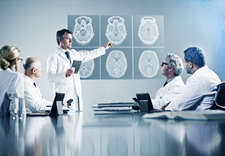News& Information
-
Medical Trends
 Home -> News& Information -> Medical Trends
Home -> News& Information -> Medical Trends
Irritable Bowel Syndrome
Author:Dr.Liu Haixia
Many people are easy to have loose bowels on spicy, cold food, stomachache on tension, and constipation on anxiety. Maybe they have got "Irritable bowel syndrome". Irritable bowel syndrome (IBS) is a functional bowel disorder characterized by abdominal pain or discomfort accompanied by changes in bowel habits. The incidence of IBS is 10-20% in European and American, and close to 5-8% in China, accounting for 20%-50% of intestinal diseases in digestive outpatients.

The main symptoms of IBS are abdominal distension, diarrhea or abdominal discomfort. The symptoms can be improved after defecation. IBS is often accompanied by changes in defecation habits, and it can be repeated or prolonged. Uusually there are no obvious organic lesions found in gastroenterological endoscopy and clinical routine examination.
At present, the diagnosis of IBS is mainly based on clinical symptoms, which are as follows:
1. Recurrent abdominal pain or discomfort;
2. Onset at least 1 day per week in the last 3 months, with two or more of the following symptoms:
(1) Symptoms are associated with defecation.
(2) Changes in the frequency of defecation.
(3) Changes in feces behavior.
The etiology of IBS is believed to be related to intestinal infection, intestinal flora imbalance, food, genetics, and psychosocial factors, et al. The direct cause of IBS is believed to be related to changes in intestinal dynamics and intestinal sensory sensitivity.

The treatment of irritable bowel syndrome is mainly to relieve symptoms, prevent recurrent attacks, and improve the patient life quality. Non-drug therapy and drug therapy are generally used according to the different patient's condition.
1. Non-drug therapy:
● Physical exercise. It may relieve the symptoms of IBS in different degrees.
● Diet regulation. It is recommend to avoid suspected food which could trigger the attack of IBS, and to avoid dairy product and bean products ,which are easy to produce gas.
● Psychotherapy. Such as cognitive behavioral therapy, relaxation therapy, hypnosis therapy and psychological treatment.
2. Drug therapy:
● Intestinal secretagogue, eg, linaclotide.
● Cellulose, eg, semen plantaginis.
● Antidepressants: eg, tricyclic antidepressants or serotonin reuptake inhibitors (SSRI) antidepressants.
● Antispastic. The selective gastrointestinal smooth muscle calcium channel blockers are the first choice for antispastic, eg, pinaverium bromide. Anticholinergic drugs scopolamine are mainly used for short-term treatment for severe abdominal pain and are not recommended for long-term use.
● Antidiarrheic, eg,montmorillonite powder. Loperamide can be used for severe diarrhea.
● Mediation for intestinal flora, eg. prebiotics, biostime, probiotics ,et al.
● Traditional Chines herbal treatment.
The following symptoms should be alarmed, eg, fever, weight loss, black stool or blood in the stool, anemia, abdominal mass, age >40 years old, family history of colorectal cancer, recent change in stool habits, changes in the form of attack or progressive aggravation of symptoms. It is recommended to do relevant tests in time for the possibility of organic intestinal lesions.




